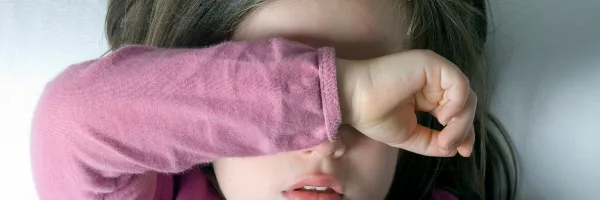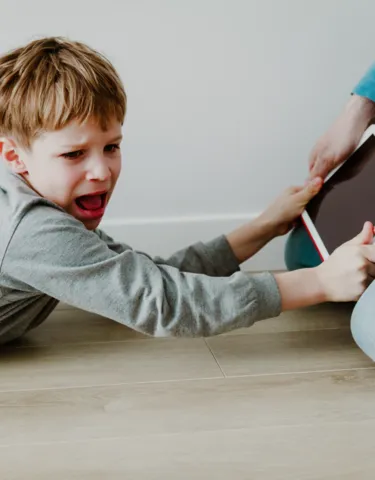As a parent it can be hard to navigate which feelings and emotions your child is expressing are part of growing up and which ones might be rooted in anxiety. In fact, many child anxiety symptoms can seem like bad behaviour or defiance. Understanding another human’s emotions and feelings can help uncover the cause behind certain behaviours.
First, let’s start with the fact that you know your child best. While these are symptoms to watch for, they don’t necessarily mean your child has anxiety. We are all different; there is no “normal”. Watch for changes in your child’s emotional states, behaviours, and attitudes. As children grow out of phases or interests, it can be hard to determine what might be a developmental stage and what might be anxiety. This article will provide some areas to watch for that you can apply to your in-depth knowledge of your child. When in doubt, it’s always good to consult a professional like your paediatrician or a child therapist.
The tricky thing about anxiety is it can show up in unexpected ways. We can challenge, get frustrated by, or provide consequences (or even rewards) for behaviours that are driven by anxiety. This can add fuel to the fire for an already anxious child. Let’s walk through some examples of symptoms that may be indicators that your child is experiencing anxiety.
What is Anxiety?
Let's clarify...
"Anxiety is a feeling of worry, nervousness, or unease, typically about an imminent event or something with an uncertain outcome."
You may have also heard of flight-flight-freeze. Watching your child’s behaviour in relation to these stress responses can help you see your child’s behaviour in a new light. For example, what feels like deviant behaviour, like not wanting to get ready for school, might be your child going into flight mode.
Let’s walk through some common child anxiety symptoms and triggers.
Running Away/Hiding
“My child hides in her bedroom when it’s time for us to go to school. We have this battle every morning!” While this can be frustrating for you as you try to get your child to school and yourself to work on time, your child may be in “flight” mode. When your child is overwhelmed, their brain's response is to escape as a means for survival. Depending on the source/degree of stress, this can be an automated stress response to keep themselves safe.
Clinginess
For parents whose child is clingy, remember they are clinging to you because you are a source of comfort. If your child is excessively clingy, sometimes even in environments they are familiar with, this can be a sign your child is experiencing anxiety. Think of yourself as home base. They can be staying close to you because they are fleeing from a perceived threat.
Physical Symptoms
Headaches, upset stomach and diarrhea can all be symptoms of child anxiety. When our body is stressed, it can carry tension (headaches) and cause an upset to our digestive system. Did you know that when we are stressed our digestive system temporarily slows down to conserve energy and send more blood to the brain? If your child is experiencing stomach aches, it could be a symptom of anxiety.
Excessive Questioning
Anxious children can have a lot of concerns. This can show up in them asking a lot of questions. “Who’s going to be there?”, “How long are we going to stay?”, “Will my friends be there?”, “Why do we have to go?”, “Can I just stay home?”. This can be their way of identifying how safe or unsafe the situation is going to be for them. Having a clear idea of what is going to happen can help them manage their stress. So, if you are tired from answering all the questions, remind yourself that they may be looking for information to ease their minds. Helping them paint a picture of the situation helps them mentally prepare for what they are walking into.
Avoidance
We as adults do it. We avoid that difficult conversation or avoid working on a big task even though we know we need to. Children also use avoidance as a coping mechanism. While our avoidance might look a lot more like procrastination, a child’s might sound like defiance.
“No. I’m not going.”
“You can’t make me.”
“No. I’m not going to do that!”
Asserting themselves can be a way for your child to feel like they have some sense of control. And control for people with anxiety is a coping mechanism. When we feel a sense of being out of control, it can be a trigger for anxiety.
Seeking Validation
“Did I do a good job cleaning my room?”, “Do you think I’ll be invited to my friend’s birthday party?”, “What do you think of my drawing?” Those experiencing anxiety can be particularly hard on themselves, and it can often make them think and feel there’s something wrong with them.
Seeking validation and getting soothing responses from a loved one can be a coping mechanism. Getting outside validation for their self-worth can be create an ongoing cycle where they are looking validate their value outside of themselves. One suggestion is to turn the question around to get their point of view first and then validate or encourage them to see if they can think of it another way. For example: “How do you think your room looks?” If their first response is unjustly harsh, encourage them to see if they can see it another way.
“Excessive seeking of reassurance is a common symptom of generalized anxiety as well as a more specific form of anxiety, Obsessive Compulsive Disorder (OCD)” says Angela Pruess LMFT, Child Therapist + Parent Coach.
Anger
Think about the last time you were overloaded with stress. Did your patience run thin? Did you snap at your family or perhaps a co-worker? As adults, we are better equipped to deal with raw anger. We process it and express it as something closer to irritability which for adults, is a common sign of anxiety. Children have less ability to regulate their anger. Their brains haven’t developed that skill and anger can be an indicator they are having a stress response.
When our brain’s emotion center is over-activated (which is what happens with anxiety) a child is more inclined to be irritable and reactive as all emotions are working in overdrive.
Heightened Emotions
Since the brain’s emotion centre is overactivated when we are experiencing anxiety, we are more emotionally responsive. If your child cries out of the blue when getting ready for bed or getting ready for school, their brain could be operating in emotional overdrive. When we are in this state, we need to release the emotion, i.e. tears. Common triggers for your child could be not getting what they want or not having enough notice to process a transition from one situation to another.
Lack of Focus
Children who live in a heightened state of stress, can be in a constant state of fight, flight, freeze. When our “survival mode” is engaged our brains work in a different capacity. For example, when a child’s amygdala is working in overdrive their ‘thinking brain’ (located in the frontal lobe) automatically becomes less accessible.
This can play out as a lack of focus, impulse control, and reactivity. A child’s performance at school can be a sign to watch for. If you receive feedback from a teacher that your child is not as engaged or is performing poorly, anxiety might be the root of the issue.
Self-Soothing
A child experiencing anxiety might regress to using comforting behaviours from early childhood. This could be sleeping with a stuffed animal, thumb-sucking or requesting comforts from their parents like a back rub.
Social Isolation
Socializing can bring a lot of pressure on a child. Anxious children that are afraid of rejection or who have been bullied, may gravitate toward independent play. If they are feeling anxious, they also may withdraw, go into social isolation or be unwilling to participate in formally enjoyed experiences.
Nightmares or Struggling to Fall Asleep
Kids who experience anxiety can have a hard time falling asleep. When the distractions of the day are gone, anxious thoughts can creep in. When we are having anxious thoughts, it can be hard physically and mentally relax.
Night waking is also common when our brains are functioning out of a state of anxiety and are more hypervigilant of any external or internal stimuli such as a noise from the hallway or a scary dream. Says Angela Pruess LMFT, Child Therapist + Parent Coach.
Changes in Eating Habits
“I’m not hungry.” Anxiety may decrease your child’s appetite. “When you experience anxiety, your fight-or-flight response kicks in and causes the central nervous system to release certain stress hormones. These stress hormones can slow down your digestion, hunger, and appetite.” States Jamie Friedlander from Healthline.
On the opposite side is binge eating. Binge eating is categorized as eating a large amount of food in a short amount of time, when one is not hungry. Emotional stress or destress often plays a role and might trigger a period of binge eating.
Negative Self-Talk
Children experiencing anxiety can have a lot of negative self-talk. Anxiety and perfectionism are also closely tied, so if your child is a high achiever, they may also be hard on themselves when they don’t meet their or your expectations. Phrases like, “I’m so stupid.” or “I never get anything right.” can be indicators that your child is experiencing anxiety.
Losing Interest in Something They Love
Like adults, when your child is feeling down, they may disengage from the things they love. For example, if your child loves Lego and then completely loses interest evaluate if you think they have grown out of it? Or perhaps are they wrestling with anxiety that is making it hard for them to find joy in the things they once loved.
Remember, knowledge is power. Having awareness of these symptoms can help you approach your child with empathy and provide them with tools that can help reduce their anxiety. Creating a loving, trusting, safe space for them to talk about what’s going on with them can make a big impact. And practicing self-compassion for yourself can provide the model they need for a healthy mindset. If you are looking for more tools for helping your anxious child, check out these additional resources.






